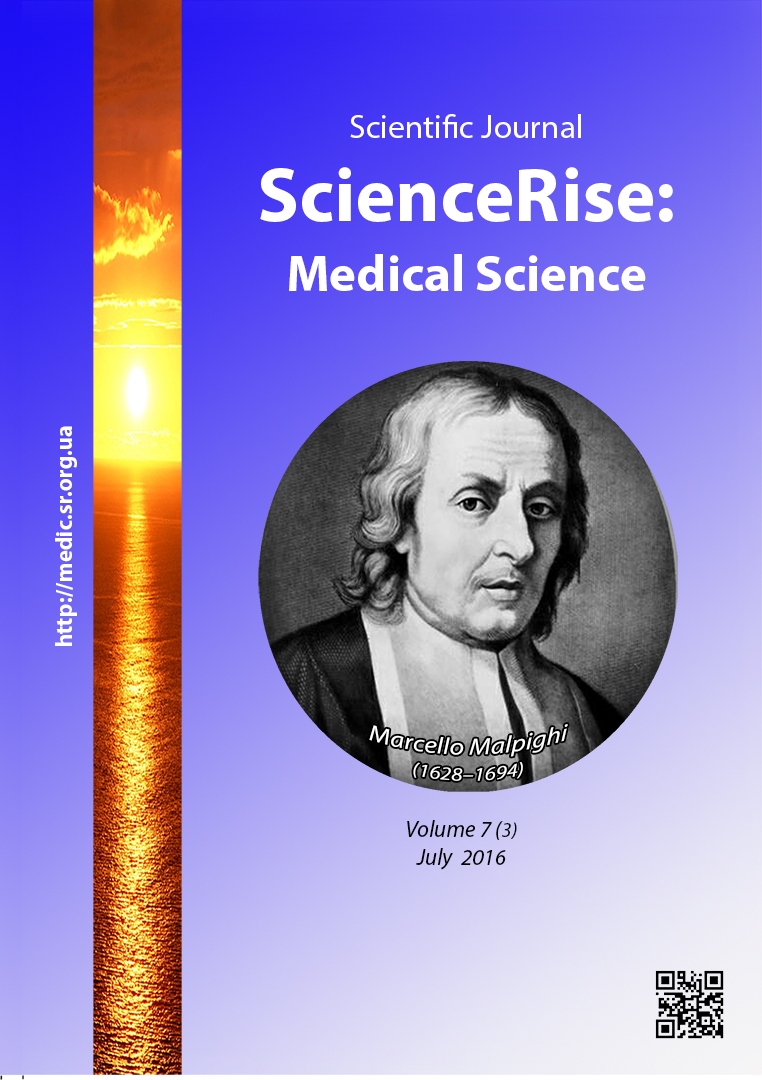The sources of addiction and types of “socially acceptable” forms of addictive behavior in women with disorders of family health
DOI:
https://doi.org/10.15587/2519-4798.2016.74213Keywords:
sources and types of “socially acceptable” addictive behavior, women, disorders of family healthAbstract
Aim – determination of the sources of addiction and study of AB in women with disorders of family interaction for revelation of targets of the further psychocorrectional work with this contingent of married couples.
Contingent - 321 married couple (MC), who asked for help because of disorder of family relations and “socially accepted” addictive behavior in women (studied group, SG). As the groups of comparison were also studied 50 MC with disorder of family health, in which women had not problems of addictive type (group of comparison 1, GC 1) and 50 conventionally harmonic MC (group of comparison 2, GC 2).
Methods. Clinical-diagnostic and psychodiagnostic with use of АUDIT T. Baboor test, battery of АUDIT-like tests (composite authors under the supervision of I.V. Linsky) and the author methodology for revelation of disorders, connected with passion for sports (fitness) for amateurs of SPORT-UDIT.
Results. There were separated three types of “socially accepted” addictive behavior, inherent to women with disorders of family relations that have akin pathogenetic mechanisms: behavior one (excessive passion for work, shopping, watching TV, internet, reading, computer games or games of chance; the main sources – shopping, work– 34,6 %; chemical one (intake of alcohol, tobacco, sedative-hypnotic preparations; the main source – tobacco)– 33,3 %; physiological one (excessive passion for food, sex, fitness, tea/coffee)– 32,1 %. These types of addictive behavior can be both isolated and combined with each other, creating in such a case the effect of mutual induction of adductive potential of person that has a negative influence on the family health status by the principle of vicious circle.
Conclusions. The established clinical and pathogenetic features of addictive behavior formed the base at elaboration of the system of psychological correction and psychoprophylactic support of family health at dependent behavior in womenReferences
- Voloshyn, P. V., Maruta, N. O. (2015). Strategiya ohorony psyhichnogo zdorov'ya naselennya Ukrai'ny: suchasni mozhlyvosti ta pereshkody. Ukrai'ns'kyj visnyk psyhonevrologii', 23 (1 (82)), 5–11.
- Yur’eva, N. M. (2014). Genderospecifichna dezadaptaciya social'nogo funkcionuvannya u zhinok, hvoryh na paranoi'dnu shyzofreniyu: analiz fenomenu ta osoblyvosti terapii' i psyhosocial'noi' reabilitacii'. Ukrai'ns'kyj visnyk psyhonevrologii', 22 (2 (79)), 139–146.
- Markova, M. V., Kosenko, K. A. (2014). Psyhoterapiya v kompleksnomu likuvanni zhinok, hvoryh na paranoi'dnu shyzofreniyu, pry riznyh modelyah rodynnoi' vzaemodii': obg'runtuvannya, zagal'ni pidhody, specyfichni osoblyvosti. Ukrai'ns'kyj visnyk psyhonevrologii', 22 (3 (80)), 69–73.
- Ajmedov, K. V., Ryabuhin, K. V. (2015). Psyhologichni osoblyvosti zhinok, hvoryh na alkogol'nu zalezhnist'. Choloviche zdorov'ya, genderna ta psyhosomatychna medycyna, 1-2, 81–84.
- Zhdanova, M. P. (2007). Psihoterapiya narusheniya zdorov'ya sem'i pri alkogolizme u zheny. Ukrainskij vestnik psihonevrologii, 15 (2 (51)), 60–67.
- Markova, M. V., Selyukova, T. V. (2000). Rol' himichnoi' zalezhnosti v rozvytku vnutrishn'osimejnoi' dezadaptacii'. Arhiv psyhiatrii', 3-4 (22-23), 25–26.
- Saunders, J. B., Aasland, O. G., Babor, T. F., de la Fuente, J. R., Grant, M. (1993). Development of the Alcohol Use Disorders Identification Test (AUDIT): WHO collaborative proect on early detection of persons with harmful alcohol consumption. II. Addiction, 88 (6), 791–804. doi: 10.1111/j.1360-0443.1993.tb02093.x
- Linskij, I. V., Minko, A. I., Artemchuk, A. F. et. al. (2009). Metod kompleksnoj ocenki addiktivnogo statusa individa i populyacii s pomoshh'yu sistemy AUDIT-podobnyh testov. Vіsnik psihіatrіi ta psihofarmakoterapіi, 2 (16), 56–70.
- Linskij, I. V., Minko, A. I., Artemchuk, A. F. et. al. (2010). Addiktivnyj status i metod ego kompleksnoj ocenki pri pomoshhi sistemy AUDIT-podobnyh testov. Psihicheskoe zdorov'e, 6 (49), 33–45.
- Linskij, I. V., Vyglazova, O. V. (2014). Addiktivnyj status bol'nyh, zavisimyh ot alkogolya. Ukrains'kij vіsnik psihonevrologіi, 22 (1 (78)), 107–113.
Downloads
Published
How to Cite
Issue
Section
License
Copyright (c) 2016 Майя Василівна Савіна

This work is licensed under a Creative Commons Attribution 4.0 International License.
Our journal abides by the Creative Commons CC BY copyright rights and permissions for open access journals.
Authors, who are published in this journal, agree to the following conditions:
1. The authors reserve the right to authorship of the work and pass the first publication right of this work to the journal under the terms of a Creative Commons CC BY, which allows others to freely distribute the published research with the obligatory reference to the authors of the original work and the first publication of the work in this journal.
2. The authors have the right to conclude separate supplement agreements that relate to non-exclusive work distribution in the form in which it has been published by the journal (for example, to upload the work to the online storage of the journal or publish it as part of a monograph), provided that the reference to the first publication of the work in this journal is included.









